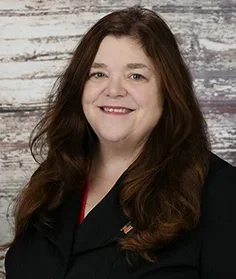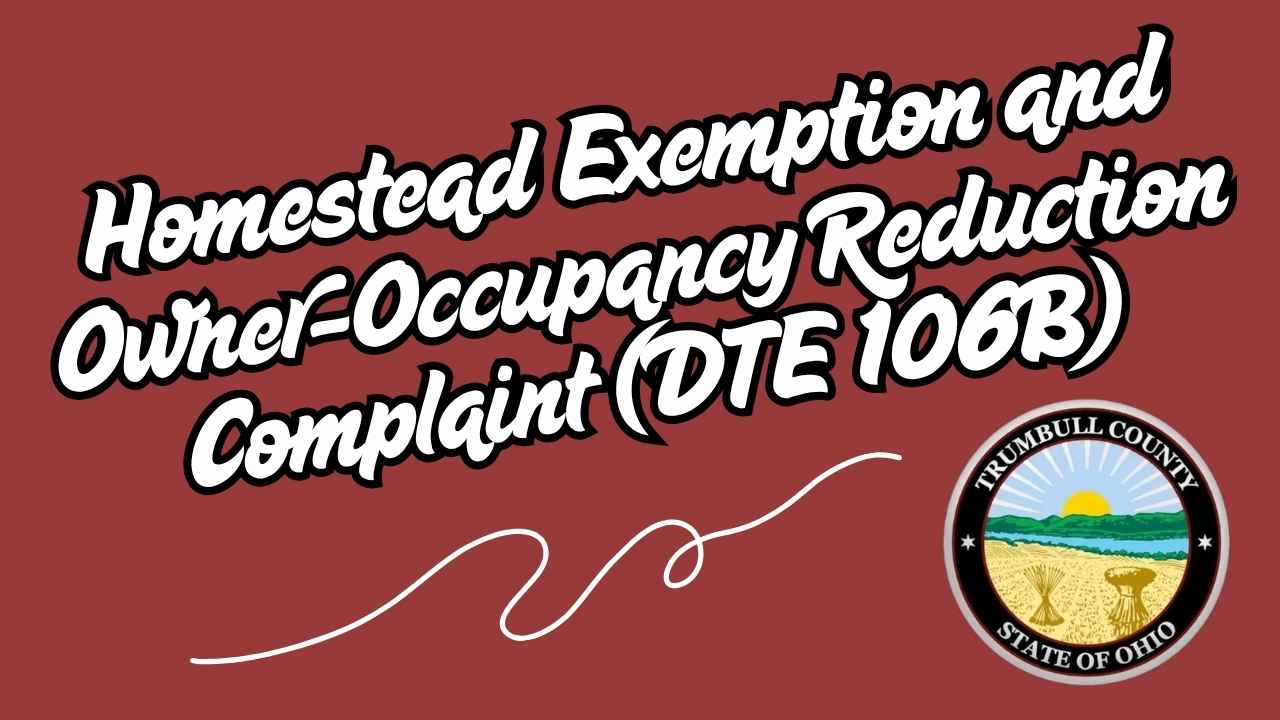If you own a home in Trumbull County, Ohio, and your Homestead Exemption or Owner-Occupancy Reduction was denied, you can appeal. You can do this by filing a DTE 106B form, known as the Homestead Exemption and Owner-Occupancy Reduction Complaint.
This form lets you challenge the county auditor’s decision with the Board of Revision. Knowing how to file can help you save on property taxes and get the benefits you deserve.
What Is the Homestead Exemption in Trumbull County?
The Homestead Exemption is a program in Ohio that helps homeowners with property taxes. In Trumbull County, it reduces the taxable value of your home by $26,200. This can save you about $535 a year, depending on local taxes.
Eligible homeowners include seniors, disabled individuals, and certain surviving spouses. You must own and live in the home as your primary residence. The program aims to ease the tax burden for those with fixed or limited incomes.
Who Qualifies for the Homestead Exemption?
To qualify for the Homestead Exemption in Trumbull County, you must meet certain criteria. Here’s a simple breakdown of who can apply:
- Age: You must be 65 or older by December 31 of the year you apply.
- Disability: You must be permanently and totally disabled as of January 1 of the application year.
- Surviving Spouse: You must be the surviving spouse of someone who received the exemption, and be at least 59 years old at the time of their death.
- Income: Your household income (Ohio Adjusted Gross Income) must not exceed $40,000 for 2025 taxes (based on 2024 income) or $38,600 for 2024 taxes (based on 2023 income).
- Residency: You must own and occupy the home as your primary residence as of January 1 of the application year.
If you meet these requirements, you can apply for the exemption to lower your property taxes.
What Is the Owner-Occupancy Reduction?
The Owner-Occupancy Reduction is another tax relief program in Trumbull County. It offers a 2.5% reduction in the taxable value of your home. This applies only to homeowners who live in their property as their primary residence.
To qualify, you must own and occupy the home by January 1 of the tax year. Unlike the Homestead Exemption, there are no age or income requirements. This makes it available to a broader group of homeowners.
Why Might Your Application Be Denied?
Sometimes, the Trumbull County Auditor’s Office may deny your Homestead Exemption or Owner-Occupancy Reduction application. Common reasons include:
- Incomplete Application: Missing forms or documents, like proof of age or disability.
- Income Exceeds Limit: Your household income is above the allowed threshold.
- Residency Issues: The property is not your primary residence.
- Incorrect Ownership: The property is owned by a corporation or trust that doesn’t qualify.
- Missed Deadlines: You didn’t file by the required date, such as December 31 for real property or the first Monday in June for manufactured homes.
If you believe the denial was unfair, you can appeal using the DTE 106B form.
What Is the DTE 106B Form?
The DTE 106B form is used to appeal a denied Homestead Exemption or Owner-Occupancy Reduction in Ohio. It’s filed with the Trumbull County Board of Revision. This board reviews your case and decides if the denial should be overturned.
You must file the DTE 106B within 60 days of receiving the denial notice for real property. For manufactured or mobile homes, the deadline is January 31 of the year following the denial. The form requires you to explain why you believe the denial was incorrect.
How to File a DTE 106B Complaint in Trumbull County
Filing a DTE 106B complaint is straightforward if you follow these steps:
- Obtain the Form: Download the DTE 106B form from the Trumbull County Auditor’s website or visit their office.
- Complete the Form: Fill out all sections, including your name, property details, and reason for the appeal.
- Gather Documents: Include proof like a driver’s license, birth certificate, or disability certificate (DTE 105E).
- Submit the Form: File it with the Trumbull County Auditor’s Office by mail or in person.
- Meet Deadlines: Ensure you file within 60 days for real property or by January 31 for manufactured homes.
- Prepare for a Hearing: The Board of Revision may schedule a hearing to review your case.
Following these steps ensures your appeal is properly submitted.
What Documents Do You Need for the Appeal?
When filing a DTE 106B complaint, you need to provide supporting documents. These prove your eligibility for the exemption or reduction. Here’s a list of common documents:
- Proof of Age: A driver’s license or birth certificate for seniors or surviving spouses.
- Proof of Disability: A DTE 105E Certificate of Disability signed by a licensed physician or psychologist.
- Income Verification: Recent Ohio income tax returns showing your Ohio Adjusted Gross Income.
- Residency Proof: A utility bill or voter registration showing the property as your primary residence.
- Trust Documents: If your property is in a trust, include the trust agreement showing you have full possession.
Having these documents ready strengthens your appeal.
Board of Revision
The Trumbull County Board of Revision (BOR) handles DTE 106B complaints. It consists of three members: the County Auditor, Treasurer, and a Commissioner. Each may appoint a representative to sit on the board.
The BOR reviews your complaint and supporting documents. They may hold a hearing where you can present your case. The burden of proof is on you, so provide clear evidence to support your appeal.
Deadlines for Filing the DTE 106B
Deadlines are critical when filing a DTE 106B complaint. Missing them can result in your appeal being dismissed. Here are the key deadlines:
- Real Property: File within 60 days of receiving the denial notice, typically by January or February.
- Manufactured or Mobile Homes: File by January 31 of the year following the denial.
- Supporting Documents: Submit all required documents with your complaint to avoid delays.
Mark these dates on your calendar to stay on track.
Key Deadlines for DTE 106B Complaints
| Property Type | Filing Deadline | Notes |
|---|---|---|
| Real Property | Within 60 days of denial notice | Usually January or February |
| Manufactured/Mobile | January 31 of the following year | Applies to denials from prior year |
What Happens After Filing the DTE 106B?
After you file the DTE 106B, the Board of Revision will look at your case. Here’s what you can expect:
- Review Process: The BOR will check your complaint and documents.
- Hearing: You might need to go to a hearing to explain your situation.
- Decision: The BOR will tell you their decision in writing.
- Tax Adjustment: If they agree with you, your property taxes will go down for that year.
This process can take a few weeks. So, be patient but also stay proactive.
Tips for a Successful Appeal
To make your DTE 106B appeal more likely to succeed, follow these tips:
- Double-Check Eligibility: Make sure you meet all the criteria before you file.
- Complete Forms Fully: Fill out every part of the DTE 106B form clearly.
- Provide Strong Evidence: Include all the documents you need, like the DTE 105E for disability.
- Meet Deadlines: Send in your complaint and documents on time.
- Seek Help if Needed: Contact the Trumbull County Auditor’s Office for help.
Following these steps can make your appeal smoother and more likely to succeed.
Common Mistakes to Avoid
When filing a DTE 106B complaint, avoid these common mistakes:
- Missing Deadlines: Late submissions are often rejected.
- Incomplete Forms: Missing information can lead to dismissal.
- Lack of Evidence: Not providing proof of eligibility weakens your case.
- Incorrect Property Details: Make sure the parcel number and address are right.
- Ignoring Hearing Notices: Always attend any scheduled BOR hearings.
Avoiding these mistakes helps ensure a fair review.
Homestead Exemption for Disabled Veterans
Trumbull County offers a special Homestead Exemption for disabled veterans. This exemption reduces taxable property value by $50,000. To qualify, you must:
- Have a 100% service-connected disability or receive 100% compensation due to individual unemployability.
- Own and occupy the home as your primary residence.
- Provide a disability rating letter from the U.S. Department of Veterans Affairs.
This exemption can greatly lower your tax bill.
Homestead Exemption vs. Disabled Veteran Exemption
| Exemption Type | Taxable Value Reduction | Eligibility Criteria |
|---|---|---|
| Homestead Exemption | $26,200 | Age 65+, disabled, or surviving spouse; income limits apply |
| Disabled Veteran Exemption | $50,000 | 100% service-connected disability; no income limit |
What If You Don’t File an Ohio Income Tax Return?
If you don’t file an Ohio income tax return, you can apply for the Homestead Exemption. You need to submit the DTE 105H form. This form checks if you meet the income requirements.
Include documents like Social Security statements or other income records. Remember, Social Security income is not counted toward the income limit.
Trusts and the Homestead Exemption
Even if your property is in a trust, you might qualify for the Homestead Exemption. The trust must be an inter vivos trust. You must be the settlor and have full control over the property.
Both revocable and irrevocable trusts can qualify. Attach the trust agreement to your application to show you meet the requirements.
Owner-Occupancy Reduction Details
The Owner-Occupancy Reduction is easier than the Homestead Exemption. It doesn’t ask for income or age proof. You just need to live in the home as your main residence by January 1.
To apply, fill out the DTE 105C form with the Trumbull County Auditor. If denied, you can appeal using the DTE 106B form. The appeal process is the same as for the Homestead Exemption.
How to Apply for the Homestead Exemption Initially
To apply for the Homestead Exemption, use the DTE 105A form. Here’s how:
- Get the Form: Download it from the Trumbull County Auditor’s website or pick it up in person.
- Fill It Out: Provide your personal and property details.
- Submit Documents: Include proof of age, disability, or income.
- File by Deadline: Submit by December 31 for real property or the first Monday in June for manufactured homes.
Applications are available online from 2017, making the process easier.
What If Your Circumstances Change?
If you already get the Homestead Exemption, you don’t need to reapply every year. But, you must tell the auditor if:
- You no longer own the home.
- You move to a new primary residence.
- Your disability status changes.
- Your income exceeds the limit.
- An owner passes away.
Use the DTE 105B Continuing Homestead Exemption Application to report changes.
Penalties for False Statements
Ohio law is strict about false statements on exemption applications. If you lie to get the Homestead Exemption, you could face:
- A fourth-degree misdemeanor charge.
- Ineligibility for the exemption for three years.
Always be honest and accurate when applying or appealing.
How the Exemption Affects Your Taxes
The Homestead Exemption lowers your property’s taxable value. For example, if your home is worth $100,000, the exemption reduces it to $73,800. This can save you hundreds of dollars each year, depending on local tax rates.
The Owner-Occupancy Reduction also lowers your tax bill by 2.5%. Combining both can lead to significant savings.
Where to Find Forms and Assistance
The Trumbull County Auditor’s Office has all the forms you need. This includes:
- DTE 105A: Homestead Exemption Application
- DTE 105B: Continuing Homestead Exemption Application
- DTE 105C: Owner-Occupancy Reduction Application
- DTE 105E: Certificate of Disability
- DTE 106B: Complaint Form
Visit their website or office for forms and help. Staff can answer your questions but can’t give legal advice.
Why Tax Relief Matters in Trumbull County
Property taxes can be tough, mainly for seniors and disabled homeowners. The Homestead Exemption and Owner-Occupancy Reduction make owning a home more affordable. By appealing a denial with the DTE 106B, you can get the benefits you’re owed.
These programs help Trumbull County residents stay in their homes. They offer financial relief and stability to eligible homeowners.
Final Thoughts
The DTE 106B form is your way to challenge an unfair denial of the Homestead Exemption or Owner-Occupancy Reduction in Trumbull County. By knowing who’s eligible, gathering the right documents, and meeting deadlines, you can appeal and lower your property taxes. Stay informed, follow the steps, and use these valuable programs to reduce your tax burden.




